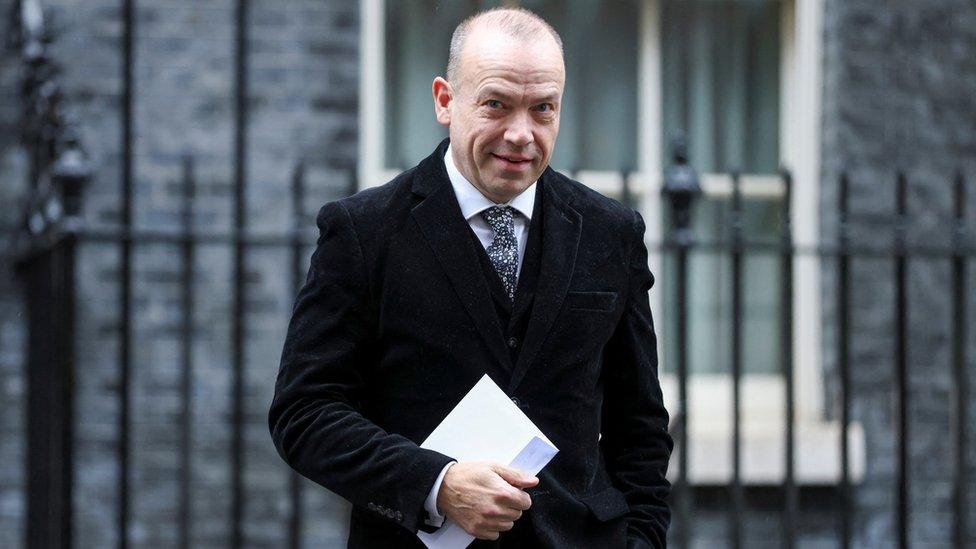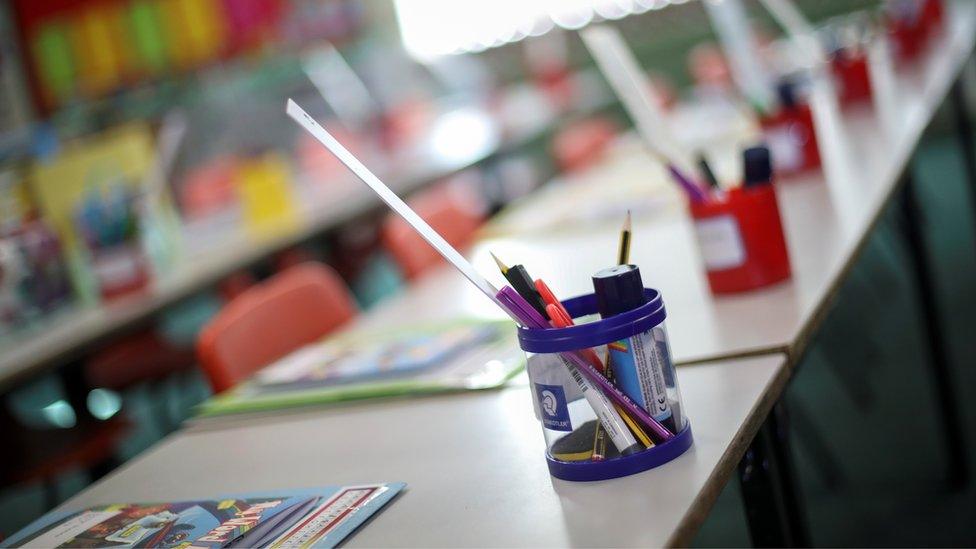NI education: Plea to government to end 'chronic underfunding'
- Published
- comments

School budgets are expected to be in the red in 2023-24
The heads of Northern Ireland's main education bodies have urged an end to "chronic underfunding".
In a letter to the Northern Ireland secretary, the seven chief executives listed issues they said were affecting education.
Chris Heaton-Harris is in charge of NI's finances and set Stormont's budget as the Democratic Unionist Party (DUP) boycott of power sharing continues.
The Department of Education's budget is under significant strain.
In October, the Education Authority said schools in Northern Ireland were expected to be £60m in the red in 2023-24, after the overall education budget was cut.
On Thursday, the chief executives of the seven main education bodies outlined their concerns to Mr Heaton-Harris.
They said they were writing to implore him to "end this cycle" of underfunding and "treat our children and young people equitably".
They cited problems in the sector including ongoing industrial action by staff over pay, inadequate funding for the fabric of the school estate and an increasing demand for support for young people with special educational needs.
"This is having an impact on all those in our schools but specifically the most vulnerable, marginalised and deprived," the letter added.
"In spite of these many pressures, staff right across the education system, both teaching and non-teaching, continue to deliver for our children.
"Their commitment and dedication to young people and wider school communities in the face of unprecedented challenges and difficulties is outstanding. Without these staff, our system would not operate."

Chris Heaton-Harris recently set Stormont's budget
The seven chief executives are:
Maria Thomasson, Comhairle na Gaelscolaiochta
Mark Baker, Controlled Schools' Support Council
Eve Bremner, Council for Catholic Maintained Schools
Gerry Campbell, Council for the Curriculum, Examinations and Assessment
Roisin Marshall, Council for Integrated Education (Nicie)
Sara Long, Education Authority
Nuala O'Neill, Governing Bodies Association NI
The leaders collectively repeated a call for "sustained investment, fair pay for all our staff and continued investment in the transformation of services".
They said that in their roles they had already taken steps to reduce spending but they remained concerned that " without equitable investment", outcomes for all our children and young people would be compromised.
And they warned the Northern Ireland secretary: "As we move into 2024 we would ask you, as you continue to oversee the financial allocation to and within Northern Ireland, to remember that education is not an optional extra but is the foundation upon which a peaceful Northern Ireland is built.
"It is critical that education in Northern Ireland is funded equitably in line with other UK regions."
They also pointed to £75m announced in the Chancellor's autumn statement for Northern Ireland in November, and said they were concerned it was being used to repay a previous budget overspend "rather than the much-needed investment required in public services".
"This decision penalises the children of today and tomorrow. A child in Strabane should be entitled to the same level of investment as a child in Sunderland, Swansea or Stirling," the letter added.
The chief executives asked Mr Heaton-Harris to meet them to discuss the challenges facing the education sector, which they warned will "remain the position" into 2024 and beyond.
A Northern Ireland Office Spokesperson said: "This year's budget allocation from the UK Government gave the Northern Ireland Department of Education a total allocation of £2.6 billion.
"The decisions required to manage this budget continue to rest with the Northern Ireland departments.
"We continue to call on NI parties to restore a locally elected, accountable and effective devolved government as soon as possible, which is the best way to govern Northern Ireland".
Related topics
- Published9 October 2023

- Published17 June 2023
